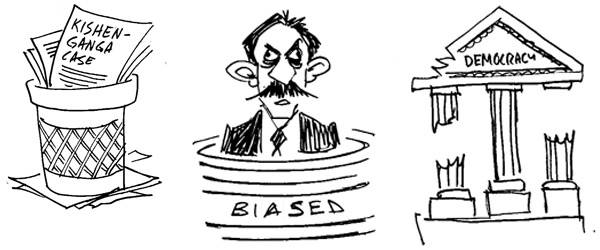
Deep water
Sir,
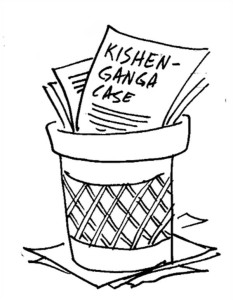 The International Court of Justice at Hague has ruled in favor of India in the Kishanganga Dam case, with the observation that “Pakistan has submitted no data on current or anticipated agricultural uses” of the water.
The International Court of Justice at Hague has ruled in favor of India in the Kishanganga Dam case, with the observation that “Pakistan has submitted no data on current or anticipated agricultural uses” of the water.The loss will have devastating consequences for Pakistan’s economy, power generation capacity and agriculture, for generations to come.
Everybody in Pakistan is blaming its lawyers for losing the case, but the problem is much deeper than it seems. The country is being run by bureaucrats who, having passed a competitive exam, are considered experts on every subject – heading various departments and state corporations. It is this bureaucracy and the advisers appointed by elected public office holders who make policies, and it were they who planned the strategy for the lawyers representing Pakistan at Hague, and for the provision of data to them.
For years, WAPDA was headed by retired generals or civil bureaucrats, and so were telecommunications, aviation, railways, petroleum, medicine, and higher education. We live in a world where developing countries utilize the best available human resources, and specialists in respective fields, to devise policies and plans for development. Countries like Japan or Germany, with hardly any natural resources, focused on developing human resources, and utilizing services of specialists in science, economics, agriculture and social sciences, achieved higher GDP than the collective GDP of many countries in the middle east.
What we have witnessed in Pakistan are such acts as appointing a doctor as an advisor on petroleum, or a pharmacist as an advisor on water and power.
Our elected representatives consider it their discretion to appoint their friends to head state corporations, ignoring the abundance of highly educated talent available in Pakistan. Many such Pakistanis have been so frustrated, that in the last five years about 2.7 million of them have left the country seeking better prospects abroad.
Tariq Ali,
Lahore.
Objection your honor
Sir,
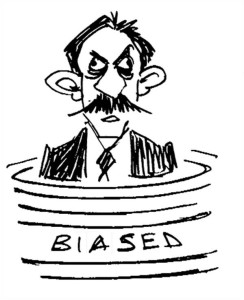 Retired chief justice Iftikhar Chaudhry has been praised for strengthening the institution of the Supreme Court and for his bravery against the military dictator Pervez Musharraf. But as he leaves the office, fairness demands that we must also listen to what his critics say.
Retired chief justice Iftikhar Chaudhry has been praised for strengthening the institution of the Supreme Court and for his bravery against the military dictator Pervez Musharraf. But as he leaves the office, fairness demands that we must also listen to what his critics say.A Geneva-based group of 60 lawyers and judges had declared he was “an inconsistent person in his approach to the administration of justice and there was a partisan bias which was patently clear and because of which there was a huge dissatisfaction in the society”.
He focused on self-projection, the report added, picking up cases with a populist appeal and ensured that his judgments were massively advertised. He tried fixing prices of tomatoes, sugar, petrol and gas, but achieved no results because the problem was beyond his domain and comprehension. Amongst the cases he took suo motu action on was the possession of two bottles of liquor by actress Atiqa Odho.
His critics say Pakistan lost billions of rupees because of his short sighted cancellation of the privatization of the steel mills. This one negative judgment stopped all foreign investment in Pakistan and foreign currency in billions of dollars went out of the country. The rupee slid from 60 to 90 against the dollar within months, and to 108 within weeks.
Despite his promises of quick justice, he paid no attention to the reformation of the subordinate courts. The backlog multiplied and corruption in the courts knows no bounds. Lawyers were divided into groups of competing mafias vying for turf, space and clout. He completely overlooked the vandalism of lawyers. He also ignored the corruption allegation on his own son, despite a public demand for making him accountable.
Also during his tenure, murderers and ransom seekers were freed on the pretext that there was no evidence against them. He overlooked the escape of high profile prisoners from jails who had perpetrated the most heinous crimes. He made no efforts or recommendations to change the laws of investigation and prosecution, to ensure that known criminals are convicted.
If he could intervene and take control of every area of the administrative domain, what stopped him from encouraging suitable changes in the criminal procedure code so that criminals and terrorists are punished? He showed concern for the missing persons, but has never spoken the murder of Punjab governor Salmaan Taseer, or the abduction of his son as well as the son of former prime minister Yousaf Raza Gilani right before the elections.
There is some irony in the fact that a judge who took oath under a PCO promulgated by Musharraf, and then gave him the authority to make changes to the constitution that he hadn’t even sought, should now claim that he should be tried for treason.
Laila S Farooq,
Islamabad.
Burying the hatchet
Sir,
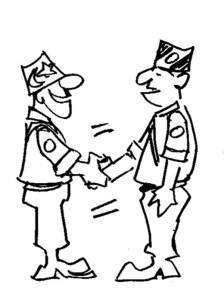 The meeting between Indian and Pakistani directors general of military operations at the GHQ in Rawalpindi is being regarded as a rare event in the chronicle of the fractured relationship between the two neighbors.
The meeting between Indian and Pakistani directors general of military operations at the GHQ in Rawalpindi is being regarded as a rare event in the chronicle of the fractured relationship between the two neighbors.Lt Gen Satish Nambiar, then DGMO of India, had visited Pakistan in 1991. Now, Lt Gen Vinod Bhatia came to formally take up the issue of tensions on the Line of Control. Observers expected a breakthrough on the LoC and it was expected that a permanent ceasefire would be agreed on.
But the meeting will go a long way in determining the future economic prospects for the region, especially for Pakistan which has been facing its worst economic crisis.
The meeting was organized on the invitation of Pakistan, soon after Afghan President Hamid Karzai visited Islamabad and Pakistan’s national security adviser Sartaj Aziz visited New Delhi.
It seems as if both sides have a new set of proposals that may lead to a high level dialogue between Pakistan and India.
An understanding between the two countries before the US and allied forces withdraw from Afghanistan is the need of the hour.
F Z Khan,
Islamabad.
Question hour
Sir,
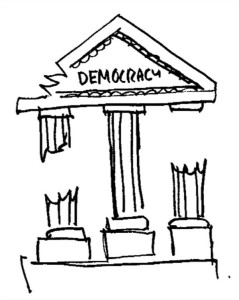 Pakistan is supposed to be a constitutional parliamentary democracy, where all power vests in the constitution and every individual that holds a public office – whether a paid bureaucrat or an elected representative – derives specific powers from constitution and is answerable to the parliament, the judiciary and the public, for any transgressions, abuse or misuse of power.
Pakistan is supposed to be a constitutional parliamentary democracy, where all power vests in the constitution and every individual that holds a public office – whether a paid bureaucrat or an elected representative – derives specific powers from constitution and is answerable to the parliament, the judiciary and the public, for any transgressions, abuse or misuse of power.Unfortunately, years of rampant misuse of powers by both elected and unconstitutional dictators, without any accountability, and a pliant weak judiciary, have given birth to a culture where rulers behave like monarchs and conquerors, considering themselves immune from laws. Equal rights and opportunities guaranteed by constitution are denied to law abiding citizens. Where does the constitution give an authority to anybody for allotting real estate amongst bureaucrats and other professionals who are being paid to do what they do, whilst a majority of the citizens of this country do not have subsidized healthcare, education, or even clean drinking water?
What constitutional authority do our public office holders have to grant repetitive amnesties to tax defaulters and vehicle smugglers, when the constitution and law mandates that the government must collect taxes from every citizen who earns above a certain limit, or imports a vehicle?
Why cannot our elected leaders follow the traditions set by established democracies, such as the UK, where the prime minister is present for the Question Hour every Wednesday when the House of Commons is in session? Why should we not follow established democratic norms, where every public servant or office holder is held accountable and have no discretionary powers to benefit an individual, compromising equal rights and opportunities of other tax paying citizens?
Ali Malik,
Lahore
Making Afghanistan
Sir,
The US and Afghanistan have not reached a settlement so far on their Bilateral Security Agreement, despite the looming troop withdrawal deadline.
At this point, the talks of politically involving the US and its allies, Russia, China, Iran, Pakistan and India to agree on a post-2014 Afghanistan are contrary to the concept of the sovereignty and independence of Afghanistan (howsoever limited).
After a decade in power, Afghan President Hamid Karzai does have a role to play in ensuring the continuation of a secular democracy in Afghanistan.
An interview given by Karzai to French newspaper Le Monde is clear evidence that Karzai seems to be politically a confused person. He does not understand the meaning and implications of the uproar against drone attacks and private security firms.
But his main problem is that as a confused politician, he is finding it difficult to practice a secular democracy in Afghanistan, and wants to sail in two boats. He is obsessed with the Loya Jirga because he failed to develop a constitutional, institutional and legal framework for a democratic process that will replace the essential and desirable functions of the medieval Jirga.
Some people fear that Afghanistan is complex country hence difficult to bring under modern political order. But if the British could administratively manage India, made up of huge complexities and diversities (and even today India with a 1.25 billion population is managed by the four major laws namely IPC, CrPC, CPC and Evidence Act, given to India by the British), there is no reason we should be daunted by the complexities of Afghanistan.
Another fear that has been expressed is that even the USSR and the US failed modernize Afghanistan. But the two superpowers had to leave Afghanistan because they went in with imperialists mindsets. Any regional help that Karzai takes will help strengthen a partnership between SAARC countries. I suggest that my own country India, with its secular democratic history, should also play a role towards such an outcome.
Hem Raj Jain,
Pennington.
The portrait on the wall
Sir,
 Pakistan is in search of her identity. Her national character has been torn apart between ideological ends throughout the history. Let us envisage, how close or far are we from the vision of founding father? Every year on national day cliché-ridden tributes are paid to his revered memory but the real spark of enthusiasm is missing. The temptation of the holiday is much greater than the sanctity of this day.
Pakistan is in search of her identity. Her national character has been torn apart between ideological ends throughout the history. Let us envisage, how close or far are we from the vision of founding father? Every year on national day cliché-ridden tributes are paid to his revered memory but the real spark of enthusiasm is missing. The temptation of the holiday is much greater than the sanctity of this day.Jinnah had laid the foundation of this country on democracy that projected true Islamic laws and regulations. As he asserted, “I am sure that democracy is in our blood. It is in our marrows. Only centuries of adverse circumstances have made that blood-cold. But now the situation has changed.” On another occasion, he said: “The foundation of our Islamic code is that we stand for liberty, equality and fraternity.”
According to Quaid-e-Azam, “The government is to maintain law and order so that life, property and religious beliefs of its subjects are fully protected by the state.”
Although dust-covered portraits of the Quaid hang sloping from the walls of many a public and private establishments, it seems that we have failed to understand what he wanted and we have failed to complete his mission.
There is still time to mend the wrongs that we have done. There is still time to reweave this society with the fibers of unity, faith and discipline.
Qundeel Aymen,
Islamabad.
An existential threat
Sir,
 The recent surge in sectarianism has caused great concern among all sections of the Pakistani society. Any divisions in the name of religion in a country which was founded apparently in the name of religion may hit its very foundation.
The recent surge in sectarianism has caused great concern among all sections of the Pakistani society. Any divisions in the name of religion in a country which was founded apparently in the name of religion may hit its very foundation.The incident in Rawalpindi reflects the inefficiency and incapacity of weakening state institutions. Political and religious leaders are playing the part of fire fighters yet no one is seriously making any effort to know the cause of the fire. Steps like imposition of curfew, and suspension and transfer of police officers are the typical eyewash strategies that have been used by the rulers in our security state. Another common strategy is to seek help from far right religious elements to curb sectarianism. This apologetic attitude of the state reveals its inability and incapacity.
The matter is of rule of law, for which the state’s determination and commitment are required. But the state is depending on rightists who in one way or the other are actually responsible for sectarianism. The policy of denial and apathy has led the country to a situation where places of worship are being desecrated, and people are being killed in broad day light in the name of faith. What was once an inclusive and tolerant society has now been transformed into a highly volatile and intolerant one. The very fabric of the Pakistani society is breaking down.
The Pakistani state negotiates and seeks peace through supplications. Matters of law and order and state authority are left to interest seeking far right militants. Party interests prevail over national interests. Political loyalties are often preferred over competence. And cracks in state institutions are evident.
The phenomenon of religiosity has fractured the society on ideological lines. What used to be routine religious events in the past now bring everything to a halt. The shrinking writ of the state is openly challenged by banned outfits. Proscribed organizations have been emboldened by the lack of effective response from the state institutions. Any armed conflict between rival factions in a country which is a haven for illegal arms trade may have serious consequences for the very existence of the state.
Pakistan needs to work on a multipronged strategy that includes practical action to contain and eliminate the menace of sectarianism.
Atif Mahmood Majoka,
Melbourne.

